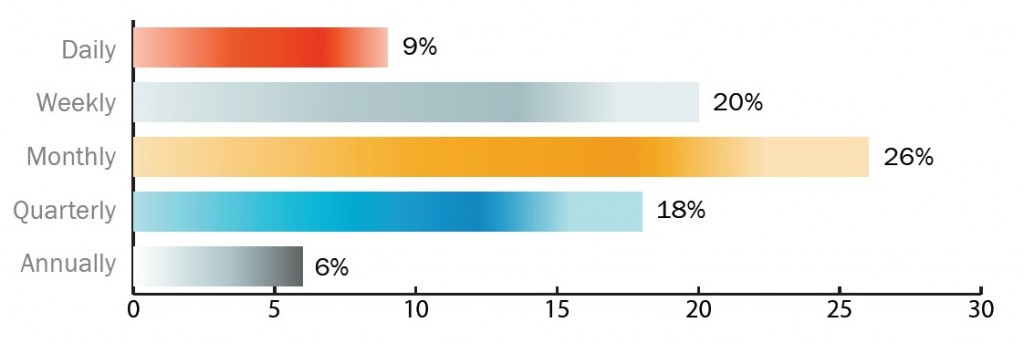Irv Shapiro. “I am fascinated by many of the results that reflect the innovation that is occurring in marketing measurement.”
So, what are the results?
A primary trend from the 2013 research is the level of support, and scrutiny, that marketers are receiving from their CEO’s around marketing measurement as a growth engine. Two thirds of CEO’s surveyed have significant influence in marketing decisions and half receive regular marketing measurements. In fact, one in ten CEO’s seek marketing measurements daily (9.2 percent) while one in five (19.7 percent) are receiving updates weekly.
How often marketing metrics are reported

(graph by Ifbyphone 2013: State of Marketing Measurement Survey Report)
What is being measured?
Marketing teams are being asked to measure a wider range of marketing metrics with a greater focus on revenue and tracking of customer interactions from both offline and online sources. Tracking new customer sources is the highest rated marketing metric utilized (by 49 percent of all respondents), with measuring increases in sales/revenue across marketing channels a very close second (48 percent).
Given the dominance of the sales-related metrics already being measured by the marketing team, it is not unreasonable to conclude that marketing measurement innovation, which enables marketers to better track and monetize engagements with customers and sales prospects, will be a high priority in coming years.
Use of marketing metrics

(graph by Ifbyphone 2013: State of Marketing Measurement Survey Report)
Marketing enjoys budget growth
Investment in an emerging generation of marketing measurement tools is needed to satisfy the CEO’s increasing demand for tracking data. In order to facilitate this, budget growth and additional marketing resources are being provided.
Possibly as a result of the increased focus from the CEO and the growing role marketing has as a growth engine, almost half of respondents (45 percent) reported an increase in their marketing budgets in the past year while only 12 percent are working with a tighter marketing budget.
Respondents were asked what their marketing personnel priorities would be for 2013/14 and a significant majority were focused on proactive and growth related strategies. Almost a third (32 percent) plan to add more full-time marketing resources, one in five respondents (19 percent) plan to invest in more contingent marketing workers, while one in 10 (10 percent) will hire a new marketing agency.
One in 10 respondents (10 percent) will also share resources with other departments, such as IT, reflecting the highly technical nature of twenty-first century marketing analytics. A much smaller percentage of respondents are planning to downsize their investment in marketing personnel in 2013/14.
The emergence of the Growth Hacker
In line with increasing marketing budgets, more marketing people are being hired. Growth hackers, marketers who combine marketing knowledge with a strong technical background to drive growth, are having an impact on improvements in marketing measurement. One quarter of respondents (25 percent) now have a Growth Hacker on their marketing team, the same percentage that have Product Managers.
Marketing teams with Growth Hackers are prioritizing investments in emerging marketing measurement technology, across both online and offline channels. Almost three quarters of marketing teams with a Growth Hacker engaged (72 percent) are experimenting with Voice-Based Marketing Automation (VBMA), 19 percent more than marketing teams generally. Meanwhile, 44 percent of marketing teams with Growth Hackers are using marketing automation software compared to only 26 percent of marketing teams generally.
Over a third of Growth Hacker-backed marketing teams (34 percent) are utilizing heat map tools compared with only 20 percent of the average marketing teams. Almost twice as many marketing teams with Growth Hackers (28 percent) are experimenting with emerging workflow automation tools, compared to 15 percent generally.
Across every category of marketing measurement technology, it is the Growth Hackers who are leading the charge in experimenting and innovating with emerging tools that will give them, their CEO, and their marketing colleagues the edge in tracking where the best results are being achieved for marketing investments.
See the complete survey at Ifbyphone.com
 Marketing is all about knowing your audience and what they want, or what you want to make them believe they want. Right? So getting knowledge about your targetmarket is crucial.
Marketing is all about knowing your audience and what they want, or what you want to make them believe they want. Right? So getting knowledge about your targetmarket is crucial.






